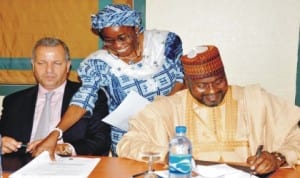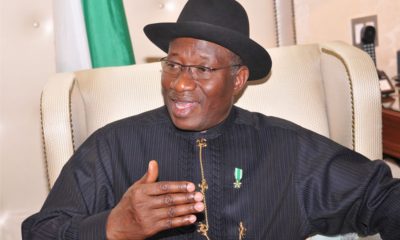Business
IMF Announces 8.5% GDP Growth For DRC

Minister of State for Power, Mr Mohammed Wakil (right), with team leader of American investors, Mr Roy Tefeez (left), signing a Memorandum of Understanding on power in Abuja last Monday. With them is Director, Legal Services, Ministry of Power, Mrs Adedotun Shoetan.
The International Mon
etary Fund (IMF) says the Democratic Republic of Congo (DRC) has witnessed 8.5 per cent GDP growth in 2013.
An IMF Executive Board report at the end of an Article IV consultation in DRC stated that the country also recorded an average of seven per cent growth between 2010 and 2012.
The report said that the Democratic Republic of Congo had continued to post strong economic growth in the recent years in spite of the difficult domestic security situation.
“Mineral production and related investments have become the main growth drivers, although economic activity is strengthening in other areas such as the agriculture.
“This has resulted in real Gross Domestic Product growth rate of 8.5 percent in 2013,’’ the report said.
It said that fiscal restraint and the absence of major external price shocks helped to further reduce inflation to a record low of one per cent at the end of 2013. “Higher mining exports and sustained inward foreign investment contributed to an overall balance of payments surplus.
“However, gross international reserves increase in 2013 was only sufficient to keep the reserve coverage at 7.7 weeks of non-aid related imports of goods and services,’’ it said.
According to the report, exchange rate remained remarkably stable since 2010, adding “notwithstanding the strong economic growth, poverty remains pervasive and the economy vulnerable.’’
It said that limited fiscal space and shocks to revenues often offset by expenditure adjustments did not support pro-poor and critical investment spending necessary for inclusive growth.
“The government implemented important reforms aimed at ‘de-dollarising’ the economy, deepening financial markets and improving public finance management,’’ it said.
The report said the executive board commended the authorities for maintaining macro-economic stability in the face of a challenging external and domestic environment.
“The board also emphasised the importance of creating fiscal space to increase priority social spending and support public investments for meeting the MDGs.
“This is possible through improvements in public financial management, better alignment of the budget with the Poverty Reduction Strategy Paper and strengthened revenue mobilisation,’’ it said.
Business
Two Federal Agencies Enter Pack On Expansion, Sustainable Electricity In Niger Delta

Business
Why The AI Boom May Extend The Reign Of Natural Gas

Business
Ogun To Join Oil-Producing States ……..As NNPCL Kicks Off Commercial Oil Production At Eba

-

 Sports2 days ago
Sports2 days ago2026 WC: Nigeria, DR Congo Awaits FIFA Verdict Today
-

 Featured5 days ago
Featured5 days agoINEC Proposes N873.78bn For 2027 Elections, N171bn For 2026 Operations
-

 News5 days ago
News5 days agoFubara Tasks Nigeria’s Surveyor-General On C of O …Says Surveyors’ Role Pivotal In Governance
-

 Featured5 days ago
Featured5 days agoFubara Dissolves Rivers Executive Council
-

 Environment2 days ago
Environment2 days agoOxfam, partners celebrate 5 years of climate governance programmes in Nigeria
-
Politics2 days ago
ADC, PDP, LP Missing As INEC Set For By- Elections In Rivers
-
Politics2 days ago
FG’s Economic Policies Not Working – APC Chieftain
-

 News5 days ago
News5 days agoAfrican Leaders Should Be Under 50 -Jonathan

